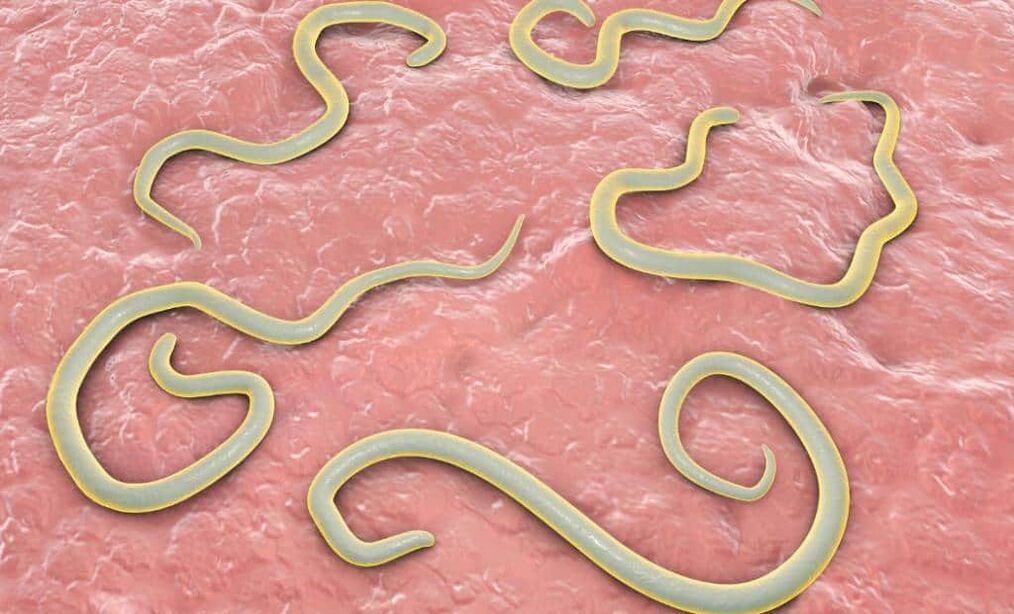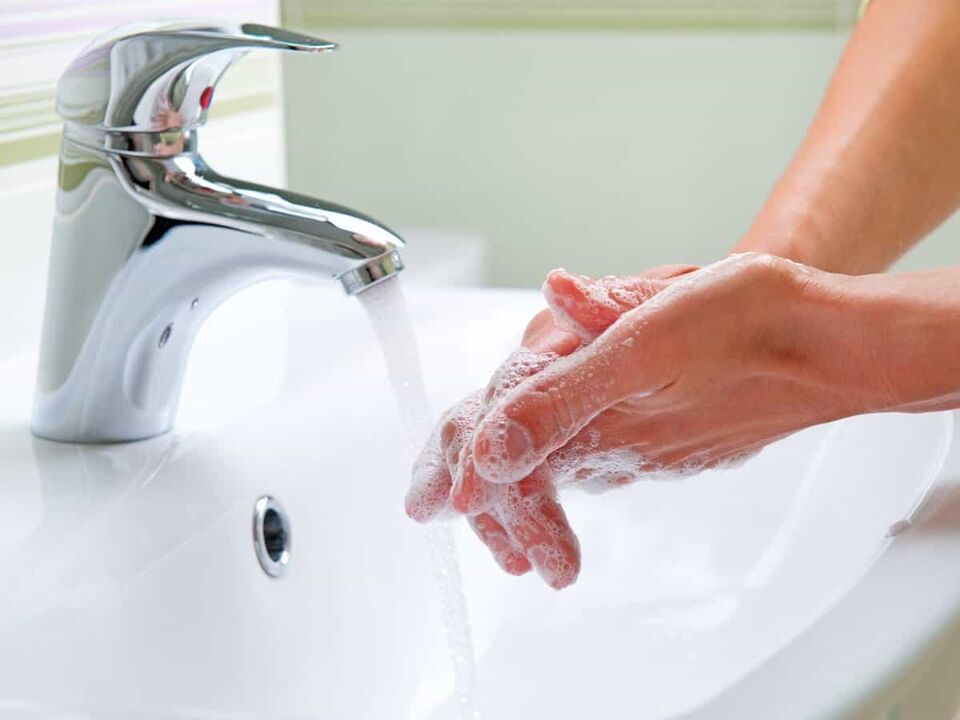Helminth preventionit consists of observing strict hygiene rules. Many of us don't even realize that we are infected with many parasites. Fatigue, listlessness, headache and poor digestion are most often attributed to overwork or the quality of food. And few people think that these symptoms can indicate parasite infestation.
The worst thing is that the helminthiasis are hidden, slowly damaging our health. The risk group includes children, whose bodies are often defenseless against parasites. Therefore, it is so important to prevent worms naturally, with the help of immunity.
Helminths and body damage
Worm infestation in humans can be caused by more than 400 species of parasitic worms. Infection usually occurs through contaminated food and water, less often helminths enter the body through the skin.

Depending on the infection routes, the parasites are divided into 3 groups:
- biohelminths- for food (equinococcus, bovine and porcine tapeworm);
- geohelminths- with hands contaminated with faeces, household items, sometimes water (whipworm, hookworm, roundworm);
- contact with worms- with personal contact with an infected person, less frequently with self-infection (pinworms, dwarf tapeworm).
According to the structure of the body, parasites are divided into the following types:
- round (nematodes);
- tape (cestodes);
- flounders (have powerful suction cups and a flat body).
The risk group includes children who attend preschool institutions, agricultural workers, people with immunodeficiencies, the elderly and the elderly. Pets can also be a risk of infection.
In adults, helminthiasis usually progress latently (hidden), have a prolonged course, and manifest with various clinical signs that masquerade as a different pathology. Children are characterized by an acute course with vivid symptoms, which are associated with peculiarities of the immune system.
Helminths use the human body as a source of food, habitat and reproduction. Instead, by releasing the products of their vital activity, the worms cause systemic toxic damage to human organs and systems.
For example, hookworm larvae secrete an anticoagulant to maintain blood flow. It is estimated that A. duodenale alone causes 0. 2 ml of blood loss per day. For the loss of 5 ml of blood, the presence of 25 pieces of helminths in the body is enough. But there are usually many more of them. As a result, the infected person has severe anemia.
According to numerous studies, helminth invasions contribute to the more frequent development of somatic diseases, worsening of chronic pathologies, having a negative effect on the host's organism, including its immune system.
A feature of most helminthiasis is a chronic course associated with the long-term presence of the pathogen in the body and repeated infections. Helminthiasis in children is usually accompanied by a variety of nonspecific symptoms: weakness, fatigue, irritability, sleep disturbance, dyspepsia, growth retardation and weight gain, and decreased immunity.
Helminth-caused diseases reduce work capacity and worsen quality of life.
The role of immunity against helminths
The immune system is on guard for our health. It protects the body against the introduction of viruses, bacteria and parasites. Unfortunately, immunity deals with the latter a little worse. This is especially true for children. The child's defenses are not sufficiently developed and helminth invasions further undermine the body's resistance to infections. Therefore, the prevention of helminths in children is very important.

Antiparasitic immunity is similar to antibacterial immunity. Cellular and humoral bonds are involved in protection against helminths. The first barrier to invaders is the skin and mucous membranes. Most often, worms enter the body through the digestive tract. The mucous membranes of the stomach and intestines contain immune cells that trigger a cascade of reactions to reject the parasite and remove it from the body.
The problem is that helminths have their own defense mechanisms, which often allow them to easily get past the first barrier.
Helminth immunity is divided into primary and secondary. As the primary person is born, he is a genetically determined defense factor. Secondary is formed during life after infection and the production of specific antibodies against a certain type of parasite.
The newly discovered TSLP (Thymus Stromal Lymphopoietin) has aroused great interest among scientists. Due to its unique properties, cytokines play an important role in protecting the body from worms. Depending on the nature of the infection, TSLP can either increase or suppress the defense reactions regulated by two types of T lymphocytes.
The probability of infection is highly dependent on innate immunity and the health of the immune system as a whole, whose effectiveness is always individual and depends on the type of worm.
The proper functioning of the immune system depends on our nutrition, if the body does not have the necessary vitamins and minerals to build immune cells, the response to infections will be weak and the fight will end in defeat.
Immunity needs biologically active substances that reach us with food. In case of chronic stress or illness, it is imperative to support the immune system with vitamins and trace elements, as the body uses all the nutrients to strengthen the nervous system, just like herbs. And only in extreme cases, resort to drug treatment.
How does worm immunity work?
Primary immunity against helminths can work in several ways:
- The parasite adapts to the host organism's internal environment, grows well, develops, multiplies. The immune response is minimal. In these cases, helminthiasis is long-term, sometimes difficult. An example is the invasion of the dwarf tapeworm.
- A moderate immune response appears to the introduction of helminths. This limits the worm's fertility. Example, roundworm.
- The defense reaction is well expressed, which blocks the full development of the parasite. The worm does not reach sexual maturity, but it can be harmful to health. The disease is short-lived or takes a latent (latent) course.
- Effective primary immunity prevents the introduction of parasites into the skin stage and mucous membranes. As a result, helminths do not penetrate internal organs and do not harm health.
Secondary immunity helps the body respond more quickly and effectively to repeated helminth invasions. This blocks the development of worms in the first stage of infection and reduces toxic effects. The protective reaction is based on the presence of antibodies (immunoglobulins) against this type of helminth in the blood.
The main links in the immune defense against parasitic invasion:
- the reaction of the tissues of Organs internal organs, which leads to isolation (formation of a capsule) and destruction of the worms;
- production of class A and E immunoglobulins;
- changes in hormonal activity, especially by estrogens, which are found in both the female and male bodies;
- hereditary factor (primary antiparasitic immunity).
An indicator of infection is a high content of eosinophils in the blood, which indicates an allergic reaction. The second important point is the marked increase in the concentration of immunoglobulin E, as long as there is no food intolerance.
Important rules of prevention
Immunity deals with introducing parasites in different ways, not always effectively enough. Our task is to help the body prevent the threat of alien invasion. Preventive measures must be followed at all times and without exception.
Parents should teach their children the rules of personal hygiene from an early age to minimize the risk of infection.
Preventive measures are simple and accessible to everyone, allowing you to completely (or almost completely) exclude the danger of helminth invasion. Still, doctors recommend that groups at risk take additional prophylaxis with medications, even if all necessary measures are taken. Medications are also taken as directed by the doctor if an infection is suspected or if worms are detected during diagnosis.
Rules for the prevention of helminthiasis:
- Buy meat and fish products at designated locations. Sellers must have a quality certificate and a health certificate.
- Cook food sufficiently. Follow the rules for salting, canning and pickling.
- Drink boiled tap water or filtered water.
- Wash vegetables and fruits under running water before using. Vegetables can be rinsed first with soap and water and then rinsed with clean water. Strawberries are immersed in a 1% soda solution. Afterwards the berries are washed well under running water. It is recommended that vegetables heavily contaminated with fertilizers are first soaked in a weak iodine solution (no more than 0. 3%).
- Follow personal hygiene rules. Wash your hands with soap and water after using the bathroom, outdoors, working in your garden, after every contact with animals, including pets.
- Clean the area regularly with disinfectants, especially the bathrooms and kitchen.
- Deworm pets according to a veterinarian's schedule (usually 1-2 times a year).
- In the case of enterobiasis, pay special attention to hand and nail hygiene, wash the child at night and in the morning, change underwear and bed linen each time, which are pre-ironed with an iron. This prevents repeated auto-infections.
- It is important to have a healthy lifestyle to strengthen and maintain your immune system. Rational nutrition, regular physical activity, correct stress response and rejection of bad habits will reduce the risk of parasite infection.
- Chemoprophylaxis 1-2 times a year according to the regimen prescribed by the physician.

Medicines for worms are taken in tablets.This is chemoprophylaxis aimed at destroying parasites that may have entered the body but have not had time to cause a reaction in the internal organs.
They have an anthelmintic effect.pumpkin seeds.Before eating, the seeds can be chopped and mixed with a little honey. The daily dosage for adults is 300 grams for children, depending on age. Up to 4 years - 80 grams, up to 7 years - 100 grams, up to 10 years - 150 grams, up to 15 years - 200 grams. After 3 hours a laxative is taken.
The prevention of helminthiasis consists of strengthening the immune system, observing the standards of personal hygiene and culinary processing of products. By following simple rules, we can protect ourselves from worm infection. Annual chemoprophylaxis helps our immune system deal with external attacks.
Talk to your doctor before taking an anthelmintic medication. The specialist will select the remedy that is right for you and make recommendations on the treatment regimen. Uncontrolled reception can not only be useless, but also harm your health. Do not forget that.
An excellent alternative to pills are worm herbs.



























